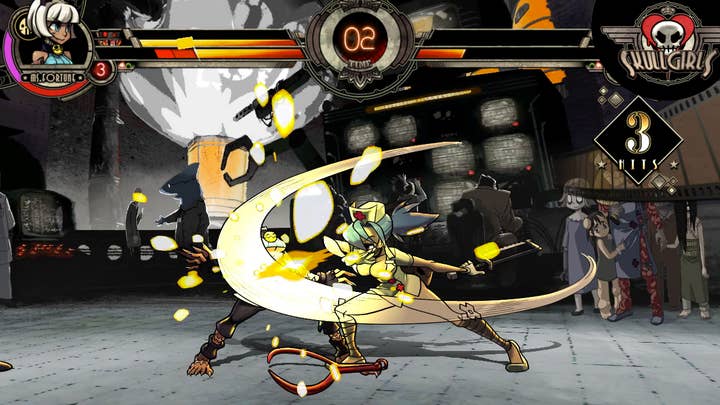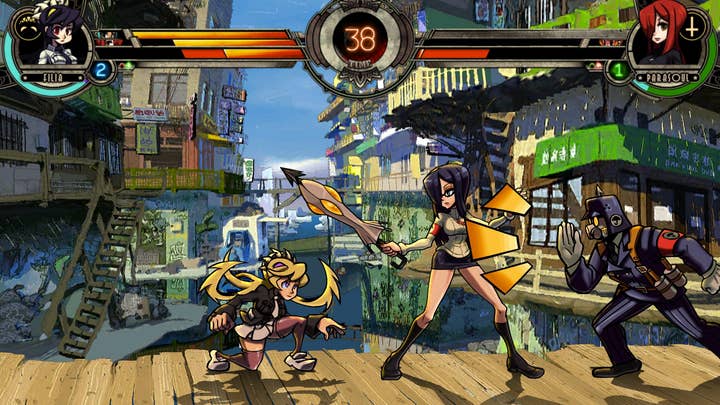Skullgirls: Developing a digital publishing model
Developer Reverge Labs and publisher Autumn Games reveal how they're changing publishing
Last week a new 2D fighting game, Skullgirls, was released for Xbox Live and PlayStation Network. The game was developed by Reverge Labs, and published by Autumn Games and Konami. GamesIndustry International spoke with Richard Wyckoff, co-founder of Reverge, and Alex Collmer, co-founder of Autumn Games, about the game and the circumstances around the publication of Skullgirls.
Reverge chose to go with a publisher, Autumn Games, rather than deal directly with Microsoft and Sony. "There were several issues, not the least of which is we needed the money to finish the game," said Wyckoff. "It's difficult to self-publish on the consoles. I've heard you get a different deal as an independent than if you go through a publisher." Reverge met Autumn Games at E3 in 2010, and saw a partner that could help them get their game together. "We pretty much knew that we were going to work with them, though it did take that summer to negotiate a deal," said Wyckoff. "Autumn's funding for Skullgirls lets us bring our team together and open our physical office and basically is why we've become established."
Reverge saw their skills as being in development, and they knew they needed not only funding, but help in marketing, working with console manufacturers, and getting the most out of their game. "We needed the help of someone with dedicated resources and publishing experience to make sure Skullgirls got exposure and to navigate all the publishing steps at the end of the process. It would have been too much for us on our own," Wyckoff said. "We get the added benefit of having this small but very passionate publisher with the resources like marketing and all sorts of contacts to do things with the project we never would have thought of or been able to do on our own. One of the best examples is that Autumn partnered with Mashon.com; they offer a plug-in T-shirt etc. store for your web site where users can customize their own goods using artwork that you supply. This has proven to be wildly popular even before our launch, because we have lots of great art. We wouldn't have been able to negotiate that kind of deal or know to even look for it if it hadn't been for Autumn."
Reverge looks to release regular DLC for Skullgirls, and to leverage the work they've done in creating the background and the artwork. "This is a big part of our relationship with Autumn," Wyckoff noted. "Many publishers, when we were pitching Skullgirls, took it as the more typical indie project. 'This is pretty cool, we might want some changes to it, we'll watch it.' But Autumn immediately saw it as an entire IP that could be extended not just with DLC but into new games of various other types, all of which we're very eager to work on." Wyckoff was clear on the value of creating an IP that can be extended to multiple titles. "I don't think it makes any sense any more, even for smaller developers like ourselves, to do one-off projects. There's so much work and world-building and great art that goes into creating a new game the more that we can use it in different places the better. That's what we look for publishers to do for us."
Reverge plans to make Skullgirls a regular on the tournament circuit. Reverge is running a number of events at several of the big fighting tournaments; "We're having people play Skullgirls to win a custom Skullgirls stick," said Wyckoff. "We hope to become part of the mainline events of these tournaments probably next season."
"I've heard you get a different deal as an independent than if you go through a publisher."
Richard Wyckoff
Wyckoff feels that finding a publishing partner is a must for an independent developer trying to put their game on both Xbox Live and PlayStation Network. "I don't even really know if it's possible to do it without a publisher," Wyckoff said. "You can go straight to the Xbox Indie channel, but then you're locked into the XNA development and you're not going to be able to do a PlayStation version at all if you wanted to. It seems if you're going to be a proper PSN/XBLA developer you're going to need a strong publisher partner involved in that."
Autumn Games wants to be that publisher for independent developers, and Alex Collmer, the co-founder and CEO of Autumn Games, made it clear how Autumn differs from the traditional publishing model. "Autumn is a company I started with Jason Donnell about three and half years ago," said Collmer. "We saw that the game business would more and more rapidly move towards a digital business, and that would not only change the way content was distributed but fundamentally change the nature of the relationship between publisher and developer. We anticipated we'd see more and more of the rise of the independent developer. We set out to build what we envisioned as the perfect publisher for an independent developer. We assumed that now, in the post-physical era, we can publish with the scope and scale of a much larger publisher but do so with a fraction of the infrastructure."

Collmer sees Skullgirls as a perfect example of how they can create games that compete with major publishers at a fraction of the cost. "Here's a title that is built to compete with much larger brethren from bigger publishers, and yet Autumn itself is a company that has 12 employees. For us, it's not just about managing headcount, it's about building a model that empowers you to take the risks associated with making, and wanting to make new franchise IP. That drives an organization that has an operating model that can profitably make new franchises, when for the most part the major publishers need to focus on exploiting pre-existing franchises because it's too risky to make new ones."
The key difference for Collmer is Autumn treating the developers as independent companies, not contractors. "If you look at how Autumn differs, first and foremost all of our development partners are their own independent companies. We assume that people create a better work and put more passion into things when it's their name on the front door," noted Collmer. "You're not going to see us buying developers; our mission is to build up the brand of our partner development companies. That right there has a pretty substantial impact on the infrastructure at the publisher level."
Collmer sees Autumn as being flexible in their approach. "For us it's not about having a dogmatic approach to how we do things, but really tailoring the marketing and distribution strategy to the product," Collmer said. Tailoring the platform strategy is also part of that flexibility. "No question about it. For a variety of generally pretty good reasons, most of the newly funded companies in the games business over the last few years tend to define themselves by the specific platforms that they focus on. 'We make Facebook games,' or 'We make iOS games,' etc. We have always had a different viewpoint. We see ourselves as a company that's designed to build franchise intellectual property that can then be extended across an ever-changing array of connected video devices. Each property has its own path through that changing array of devices."
Autumn Games has several examples to illustrate their flexibility, and Collmer described one:"In the case of the NASCAR Champion Jimmie Johnson game we published, that needed a traditional console release to establish the brand of the franchise, in much the same way that the film world uses the theatrical window to establish the brand of those films, but ultimately express a lot of their margin off of downstream platforms from there. You'll certainly see us take that Jimmie Johnson franchise, now that it's established and legitimized, and extend it to the more traditional kind of mobile, social and pure digital platforms."
The latest game Autumn published, Skullgirls, was different. "We felt Skullgirls belonged initially on the console downloadable platforms, and there was really in our eyes no need for a physical component to it. We want it delivered in the highest quality possible. We certainly have big plans about where that property can and will be extended, and we will be making announcements about that in the coming months," noted Collmer.
Typically publishers like Electronic Arts and Activision would own the brands and the IP, and the developers would own the code, but they would have no say in the story IP and how that would be used in the future. Autumn's model is different. "We're literally true partners in the extension of that IP. To be totally honest, all of our relationships are different. I think every developer has a different viewpoint on things, what's important to them and what's less important," Collmer said. "Certainly we structure our business to work with our development partners to take those core IP that are created on whatever the initial platform is and then extend them, not only horizontally on other games platforms but beyond that into linear and traditional media and merchandising. The way all the relationships are set up, the developers are true partners in that extension exercise across the board. The developers are going to participate alongside of us in the economic benefits."
"You're not going to see us buying developers; our mission is to build up the brand of our partner development companies."
Alex Collmer
Autumn is looking for products that have longer-term potential. "For us, when we get involved in something we want to be able to convince ourselves that it has a chance to be a valuable and extendable franchise, within games and into other media. We recognize full well we're not going to succeed in doing that in every case. Everything we do, we try to do with premium partners - for our racing franchise we partnered with the Michael Jordan of NASCAR, Jimmie Johnson, and he's been a great partner, and we feel that's a real franchise that hopefully we can keep going with him for many years to come. Our crack at entering the fighting genre is with Reverge, and we couldn't possibly be any happier with how that turned out. The team is just amazing, their vision from day one has been a real pleasure to watch come together, and we've been very happy to support them in every way we can. That's another franchise that, just looking at the art, you can see how it has a lot of potential in a number of different ways."
Collmer sees the way Reverge interacted with fans in the development of Skullgirls as a harbinger of the future. "They've done such a great job at allowing the fans to feel that they're part of the process," Collmer said. "I think it's hard for a developer or a publisher to open themselves up like that. We see that trend gaining momentum. We've all been watching what's been going on in Kickstarter with Tim Schafer and the folks who have followed him since."
If developers can get funding through Kickstarter or similar places, do they still need a publisher? Collmer, not surprisingly, thinks they do. "Ultimately we feel in many of those cases there's still a role for the publisher, albeit probably a pretty different role than the traditional one. We feel like we do great and original marketing for each of our properties, that's certainly something that most developers don't have within their companies. As more and more distribution platforms appear on the digital side, managing that complex array of digital distribution outlets is a process as well."
New business models for games such as free-to-play or ad-supported games are becoming more prevalent. Autumn is looking at different business models for how games are monetized for different platforms, according to Collmer. "As publishers we all have to be keeping a very close ear to the track as different models emerge. Certainly free-to-play has proven to be a very powerful model, and we will certainly have free-to-play games this year, and it's something we're very excited about. There is no one-size-fits-all model."

The last quarter in traditional retail has been pretty depressing, with 20% or more drops in sales every month over the previous year. Will the next generation of consoles turn things around, or are we seeing a more fundamental shift in the types of games that people play and where they acquire them? "That's a question that we're all wrestling with day and night," said Collmer, but he's positive about one thing at least. "Fundamentally, I don't believe that people are all of a sudden going to decide that they no longer like quality entertainment experiences. I think that console quality experience is always going to be in demand. There's going to be an increasing array of ways people can find that experience."
The future for games looks bright in Collmer's view. "The great thing that's come from the rise of Facebook gaming and mobile gaming is that we now have dramatically more gamers out there. The funny thing is you would never hear someone call themselves a 'filmer'; we all watch movies. It doesn't make any sense. Yet the term 'gamer' is still commonplace, and it's becoming increasingly irrelevant. We think many people are going to come in though those light-touch experiences and wander up the chain to great games that have emotional resonance."
"I think that console quality experience is always going to be in demand."
Alex Collmer
Where is Autumn looking for growth, when there are so many choices...different countries, different platforms, social, mobile, and other possibilities? "Mobile is certainly very interesting," noted Collmer. "I would expect the that definition of mobile starts to get pretty blurry in the years ahead. You just look at the new iPad and think about how much horsepower there is there. You can deliver a pretty compelling experience, not only on the iPad but onto a connected television as well. We certainly believe mobile is going to be a very big part of our strategy."
Collmer believes that Autumn has a winning strategy to cope with the changes ahead. "We feel like we're building a company that really fits a need in the business. We've found when we hook up with developers they're generally pretty excited about the opportunity to work independently, and be as creative as they want to be, and own a large stake in what they're creating. I hope that we can continue to play a meaningful role in the rise of the independent developer and it continues. We're really excited about what we see ahead."

